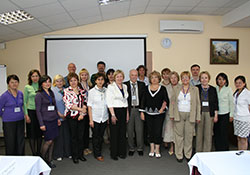Measles and Rubella Laboratory Network meeting for newly independent states

WHO
The historic town of L’viv in western Ukraine provided the backdrop for a WHO/Europe Measles and Rubella Laboratory Network meeting on 17–19 May 2011. Participants included representatives from reference laboratories for measles and rubella in all the newly independent states, as well as representatives from the WHO Regional Reference Laboratories from Moscow and Luxembourg. The meeting provided an opportunity to strengthen the commitment to the WHO European measles and rubella elimination goal and to share updates on the progress of the WHO measles-rubella elimination programme, from both WHO/Europe and country perspectives.
The programme uses the genetic analysis provided by laboratories in the network extensively to understand the transmission patterns of currently circulating measles and rubella strains, and to determine sources of importation. This analysis also provides in-depth knowledge about the progress of the elimination programme by showing that more and more genetic lineages of viruses are being wiped out.
The meeting offered an opportunity to present and discuss the performance of individual laboratories. Special focus was given to the status of the surveillance component of the programme, particularly the laboratory-based surveillance. Extensive discussions were held on the challenges laboratories are facing in terms of case investigation, especially sample collection and sample transportation within and between countries.
As in-depth laboratory investigation plays a critical role in the measles-rubella elimination programme, Member States are being urged to ensure complete laboratory investigation of all sporadic cases and outbreaks, and to facilitate cross-border sample transportation. The L’viv meeting offered an opportunity to reinforce this important message.



